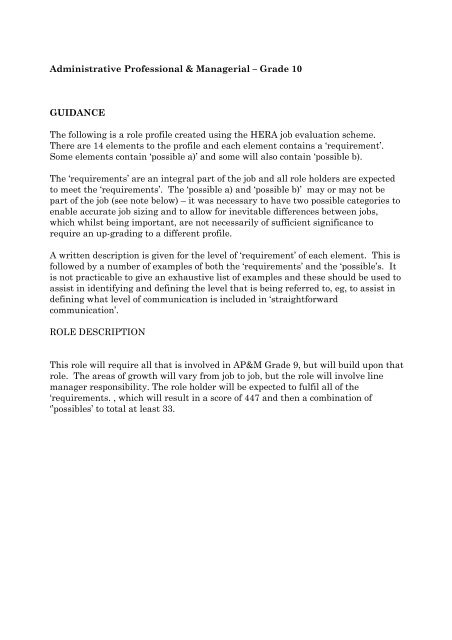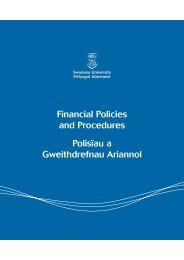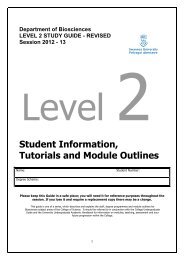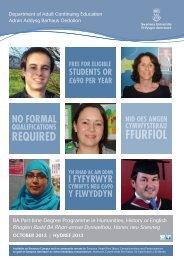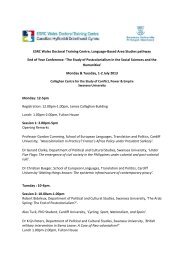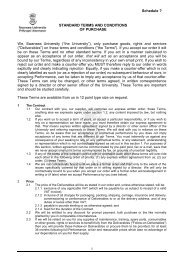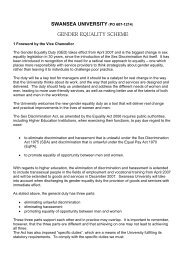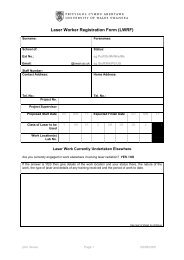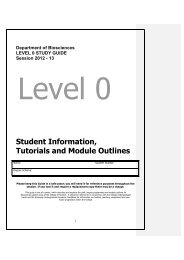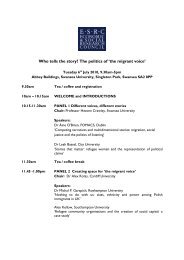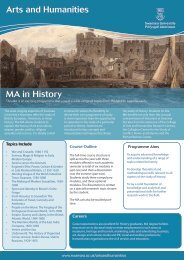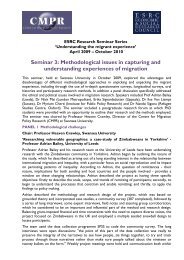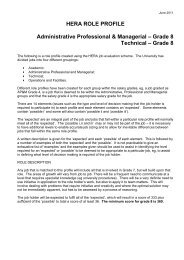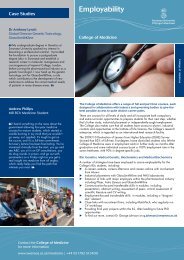Administrative Professional & Managerial â Grade 10 GUIDANCE ...
Administrative Professional & Managerial â Grade 10 GUIDANCE ...
Administrative Professional & Managerial â Grade 10 GUIDANCE ...
Create successful ePaper yourself
Turn your PDF publications into a flip-book with our unique Google optimized e-Paper software.
<strong>Administrative</strong> <strong>Professional</strong> & <strong>Managerial</strong> – <strong>Grade</strong> <strong>10</strong><br />
<strong>GUIDANCE</strong><br />
The following is a role profile created using the HERA job evaluation scheme.<br />
There are 14 elements to the profile and each element contains a ‘requirement’.<br />
Some elements contain ‘possible a)’ and some will also contain ‘possible b).<br />
The ‘requirements’ are an integral part of the job and all role holders are expected<br />
to meet the ‘requirements’. The ‘possible a) and ‘possible b)’ may or may not be<br />
part of the job (see note below) – it was necessary to have two possible categories to<br />
enable accurate job sizing and to allow for inevitable differences between jobs,<br />
which whilst being important, are not necessarily of sufficient significance to<br />
require an up-grading to a different profile.<br />
A written description is given for the level of ‘requirement’ of each element. This is<br />
followed by a number of examples of both the ‘requirements’ and the ‘possible’s. It<br />
is not practicable to give an exhaustive list of examples and these should be used to<br />
assist in identifying and defining the level that is being referred to, eg, to assist in<br />
defining what level of communication is included in ‘straightforward<br />
communication’.<br />
ROLE DESCRIPTION<br />
This role will require all that is involved in AP&M <strong>Grade</strong> 9, but will build upon that<br />
role. The areas of growth will vary from job to job, but the role will involve line<br />
manager responsibility. The role holder will be expected to fulfil all of the<br />
‘requirements. , which will result in a score of 447 and then a combination of<br />
‘’possibles’ to total at least 33.
COMMUNICATIONS<br />
Oral communication:<br />
Covers communication in both informal and formal situations. This may include the need to<br />
convey basic factual information clearly and accurately; conveying information in the most<br />
appropriate format; and explaining complex or detailed specialist information.<br />
REQUIREMENT: Communicating straightforward information in a clear and accurate manner<br />
will be an integral part of this role and will be required on a daily basis.<br />
There will also be a considerable (daily) need to communicate information that:<br />
(i.) requires considerable consideration as to the format and language used;<br />
and/or<br />
(ii.) clarifies complicated issues;<br />
and/or<br />
(iii.) employs a range of language over and above that found in standard everyday usage;<br />
EXAMPLES:<br />
• Explaining matters that are specialist, perhaps technical, legal or financial.<br />
• Making presentations involving explanations of specific topics to those who do not have a<br />
high level if familiarity or knowledge of those topics.<br />
• Ordering specialist equipment where there is a need to discuss technical specifications with<br />
the customer and/or the provider.<br />
POSSIBLE A) There may be some requirement *to convey and understand communication of a<br />
complex or conceptual nature which typically would not be understandable to non-specialists.<br />
This requirement will not be a predominant part of the job.<br />
EXAMPLES<br />
• Providing a detailed explanation of how a complex system or a set of regulations operates;<br />
• Conveying/explaining complex legal and financial requirements and their implications to<br />
colleagues.<br />
• Influencing others’ thinking and negotiating with them to achieve an outcome.<br />
• Interpreting technical or conceptual information into or from a foreign language.<br />
REQUIREMENT AAC 28<br />
POSSIBLE A) AAB +7<br />
2
Written or electronic communication and visual media:<br />
Covers communication in both informal and formal situations.<br />
REQUIREMENT: The role holder will be expected to deal with the written word as a<br />
constant part of their job. This may be in the form of letters, reports or other documents, but<br />
will be of a straightforward nature.<br />
EXAMPLES:<br />
• Use of e-mail to provide and receive straightforward information.<br />
• Writing messages, eg telephone messages, for others.<br />
• Following straightforward instructions from colleagues.<br />
• Typing memos, letters and reports.<br />
There will also be a frequent (daily) need to communicate information that needs careful<br />
explanation or interpretation to help others understand, taking into account what to<br />
communicate and how best to convey the information to others. Communication that:<br />
(i.)<br />
(ii.)<br />
(iii.)<br />
requires considerable consideration as to the format, tone and language used;<br />
and/or;<br />
clarifies complicated issues;<br />
and/or<br />
employs a range of language over and above that found in standard everyday usage;<br />
EXAMPLES<br />
• Drafting a standard tender document.<br />
• Drafting short factual reports.<br />
• Constructing minutes of meetings.<br />
• Writing reports and letters that are standard or routine.<br />
• Drafting University policies and procedures.<br />
POSSIBLE A) There may also be some (at least monthly, but not daily) requirement to both<br />
convey and understand communication of a complex, specialist or conceptual nature. This<br />
includes material that would not be immediately understandable to those outside the area of<br />
work or combines topics drawn from a number of disciplines.<br />
EXAMPLES<br />
• Drafting user and training manuals for equipment, systems or software.<br />
• Writing explanations of complex systems, regulations or procedures.<br />
• Preparing technical specifications for complex contracts such as new buildings, service<br />
specifications or capital equipment. Producing policy questions, procedures and<br />
guidelines on complex systems or subject.<br />
• Writing complex reports, letters or other documents dealing with complex, contentious<br />
and sensitive situations.<br />
• Writing explanations of complex systems, regulations or procedures.<br />
REQUIREMENT AAC 23<br />
POSSIBLE A) AAB +6<br />
3
PASTORAL CARE AND WELFARE<br />
Covers the welfare and well being of students and staff within the institution, in both informal<br />
and formal situations. This may include the need to be aware of the support services available;<br />
giving supportive advice and guidance; and counselling others on specific issues.<br />
Requirement: The role holder will either:<br />
Supervise or line-manage staff (probably a small operational team of up to 12), although it is<br />
possible that it will be for a larger team, for whom they will be the first point of call when<br />
issues concerning pastoral care and welfare arise. There will however always be a line<br />
manager or Personnel Officer to whom difficult issues can be referred; however, the role<br />
holder would be expected to have some knowledge and understanding of the University’s<br />
procedures and to be able to apply those procedures to their team members.<br />
OR<br />
POSSIBLE A) It is possible that the role holder will work in a specialist area in a<br />
professional capacity, such as, Students Services and may therefore be called upon to deal with<br />
distressed colleagues or students and handle situations which require sensitivity, a high level<br />
of awareness of confidentiality and general tact and diplomacy, at a higher than basic level,<br />
this will arise on a weekly basis or it may arise more frequently.<br />
The role holder will be expected to have a high level of knowledge of University’s policies and<br />
probably of legislation relating to welfare issues, and will guide and advise others on these<br />
issues.<br />
EXAMPLES<br />
• Dealing with and investigating complaints which may lead to disciplinary procedures.<br />
• Dealing with highly confidential information.<br />
• Advising others on the University’s procedures.<br />
• Assisting in creating procedures to ensure that the University is compliant with current<br />
legislation.<br />
REQUIREMENT BBC 23<br />
POSSIBLE A) AAC +19<br />
4
TEAM DEVELOPMENT<br />
Covers the development of the skills and knowledge of others in the work team. This may<br />
include the induction of new colleagues; coaching and appraising any individuals who are<br />
supervised, mentored or managed by you; and giving guidance or advice to one’s peers or<br />
supervision on specific aspects of work.<br />
REQUIREMENT: Assistance in training and guiding new members of staff who join the work<br />
team, is likely to be an occasional part of the job (or at this grade it may be that much of it is<br />
delegated to others).<br />
EXAMPLES<br />
• Showing a new member of staff around the workplace<br />
• Showing a new member of staff how to use the telephone, photocopier or how the filing<br />
system works.<br />
• Showing new members of staff any system or procedure that is relevant to the particular area<br />
of work.<br />
The role holder will also (in addition to the above ‘requirement’) have some responsibility for the<br />
development of an operational team. This will be either:<br />
(a)<br />
Some specific responsibility for providing training or instruction to other members of the<br />
work team on a regular (once or twice per year) basis. Coaching members of the work<br />
team formally or informally.<br />
OR<br />
(b)<br />
The role holder will also be required to identify learning/development needs of team<br />
members, eg, through appraisal<br />
POSSIBLE A)<br />
It is possible that the role holder will be involved in the above ‘requirement and in both a and b<br />
(under Possible A).<br />
REQUIREMENT (a)<br />
(b)<br />
BBC<br />
BCB<br />
26<br />
POSSIBLE A) BBB +11<br />
5
TEAMWORK AND MOTIVATION<br />
Covers team work and team leadership when working in both internal and external teams. This<br />
may include the need to contribute as an active member of the team; motivating others in the<br />
team; and providing leaderships and direction for the team.<br />
Requirement: The role holder will supervise or line-manage a team. This would include<br />
agreeing and clarifying task objectives; motivating team members and having overall<br />
responsibility for the team achieving deadlines and objectives. Being responsible for allocating<br />
work, monitoring the team’s achievement and setting and monitoring individual achievement,<br />
giving feedback and praise. Taking initial remedial action if required.<br />
• Overseeing the completion of a project.<br />
• Managing an operational team that is a sub-section of a larger team/section/department.<br />
POSSIBLE A) The role holder may contribute to or have some significant responsibility for a<br />
larger team that has responsibility for a considerable area of work within the University. This is<br />
likely to be a team that has several smaller teams in it.<br />
• Deputising for the manager of a team that covers a significant area of work within the<br />
university, eg, Finance.<br />
• Assisting in the day-to-day running of a team that covers a significant area of work within<br />
the university to include contributing to the strategic aims of that section and thereby<br />
indirectly contributing to the strategic aims of the University.<br />
REQUIREMENT DDADD 37<br />
POSSIBLE A) DDABD +8<br />
6
SERVICE DELIVERY<br />
Covers the provision of help and assistance to a high standard of service to students, visitors,<br />
members of staff and other users of the institution. This may include reacting to requests for<br />
information or advice; actively offering or promoting the services of the institution to others; and<br />
setting the overall standards of service offered.<br />
REQUIREMENT: The role holder will be expected to explore the customers’ needs and<br />
adapt the service to meet those needs for the area or sub-section for which the role holder<br />
has responsibility. At this grade this level of requirement will be predominant.<br />
EXAMPLES<br />
• Approaching customers to establish what is required (eg agreeing a conference<br />
programme or details of a research contract, designing promotional campaign material<br />
or discussing future skill needs with employers).<br />
• Contacting potential customers to let them know of new services.<br />
• Surveying customer needs and obtaining information from them about their assessment<br />
of the service (eg obtaining student feedback).<br />
• Providing feedback on the levels of service usage (eg levels of room occupancy or stock<br />
use and suggesting ways in which the service can be made more effective.<br />
POSSIBLE A) It is possible that the role holder will also assist in establishing the service<br />
level and quality of service for a considerable area of work. At this grade this level of<br />
requirement will be important but not predominant.<br />
• Setting and maintaining standards for cleaning services.<br />
• Setting and maintaining standards relating to the services offered by a Service<br />
Department, eg, Personnel.<br />
REQUIREMENT DAD 47<br />
POSSIBLE A) DAB +12<br />
7
PLANNING AND ORGANISING RESOURCES<br />
Covers organising, prioritising and planning time and resources, be they human, physical or<br />
financial. This may include planning and organising one’s own work; planning work for others<br />
on day-to-day basis, planning individual tasks or projects; carrying out operational planning; and<br />
planning for the coming years.<br />
REQUIREMENT: The role holder will be required, on a daily basis, to plan, prioritise and<br />
organise work of self and others to meet laid down objectives. This will be in the capacity of a<br />
manager of an organisational unit or section or as a deputy.<br />
EXAMPLES:<br />
• Managing and being accountable for the resources (people, equipment, money) of a subsection<br />
of a department or an area of work within the University.<br />
• Managing a specific project, eg, organising a conference or event such as a graduation<br />
ceremony or open day.<br />
POSSIBLE A) The role holder will be in an operational management role with responsibility<br />
for formulating the type of plan that will affect a substantial area of work, it is likely to last<br />
longer than one year and will possibly involve people from several teams.<br />
At this grade the role holder is likely to assist with this, or will have a shared responsibility for<br />
it or will be responsible for an important but moderate sized area of work.<br />
• Setting the budget.<br />
• Managing the staff.<br />
• Setting objectives.<br />
• Monitoring progress and keeping to the timescale.<br />
• Planning for the future.<br />
• Co-ordinating and monitoring the roll out of plans.<br />
REQUIREMENT: DDADD +37<br />
POSSIBLE A) DDABD +8<br />
8
INITIATIVE AND PROBLEM SOLVING<br />
Covers identifying or developing options and selecting solutions to problems, which occur in the<br />
role. This may include using initiative to select from available options; resolving problems<br />
where an immediate solution may not be apparent; dealing with complex problems; and<br />
anticipating problems which could have major repercussions.<br />
REQUIREMENT: At this grade there will be considerable need to resolve problems that are<br />
predictable but do not occur very frequently. The range of choices are defined, for example, by<br />
a set of procedures or guidelines or by training and application of knowledge. The extent and<br />
frequency of involvement in this level of decision making will be minor and infrequent.<br />
EXAMPLES<br />
• Handling grading, grievances or disciplinary issues.<br />
• Dealing with attendance problems.<br />
There will also be some need for the role to resolve problems that occur infrequently where the<br />
available guidance is not specific. The range of information available complicates the choice of<br />
solution and the way to resolve the situation is not clear. This is likely to include having to deal<br />
with several complex problems at the same time .This will not be a predominant requirement; it<br />
may be that the role holder is required to lend some assistance to a line manager or colleague<br />
who has overall responsibility for this level.<br />
EXAMPLES<br />
• Balancing the department’s budget and resources against needs and plans.<br />
• Investigating an area of ineffective working or systems failure and developing approaches to<br />
improve operational effectiveness by introducing a new system or simplifying practices of an<br />
office,<br />
• Developing new guidelines or procedures, such as those regulating use of finance or<br />
managing attendance.<br />
• Investigating, developing, improving complex systems, eg, computer programs.<br />
POSSIBLE A) Resolving problems that occur infrequently where the available guidance is not<br />
specific will be a frequent (weekly) requirement. The range of information available<br />
complicates the choice of solution and the way to resolve the situation is not clear. This is likely<br />
to include having to deal with several complex problems at the same time .This will not be a<br />
predominant requirement; it may be that the role holder is required to lend some assistance to a<br />
line manager who has overall responsibility for this level (see above for examples).<br />
REQUIREMENT DABD 39<br />
POSSIBLE A) DDAD +16<br />
9
ANALYSIS AND RESEARCH<br />
Covers investigating issues, analysing information and carrying out research. This may include<br />
following standard procedures to gather and analyse data; identifying and designing appropriate<br />
methods of research; collating and analysing a range of data from different sources; and<br />
establishing new methods or models for research, setting the context for research.<br />
REQUIREMENT: The role holder will be expected to gather and analyse data from a variety<br />
of sources.<br />
EXAMPLES<br />
• Keep particular data on a data/spreadsheet to provide others with information, eg,<br />
monitoring resource usage. This will involve some understanding of the data and how to<br />
manipulate it in order to provide certain specified information.<br />
• Seek information out from a variety of sources as per the requests of others, eg, conducting<br />
a web search for some specified information, or ascertaining the number of students<br />
enrolled for a course.<br />
• Conducting basic searches for documents or books.<br />
There will also be some (this will be important, but not predominant) need to decide how to<br />
conduct an investigation as well as analyse and interpret the results.<br />
EXAMPLES<br />
• Conducting enquiries into complex complaints or system failures and indicating where<br />
improvements are needed.<br />
POSSIBLE A) There may be a frequent (at least weekly) need to decide how to conduct an<br />
investigation as well as analyse and interpret the results.<br />
EXAMPLES<br />
• Conducting enquiries into complex complaints or system failures and indicating where<br />
improvements are needed.<br />
REQUIREMENT: DABDD 25<br />
POSSIBLE A): DDADD +12<br />
<strong>10</strong>
WORK ENVIRONMENT<br />
Covers the impact the working environment has on you and your ability to respond to and<br />
control the environment safely. This may include such things as the temperature, noise or fumes,<br />
the work position and working in an outdoor environment.<br />
REQUIREMENT: The role holder will generally work in a stable environment, eg an office.<br />
There are three possible levels that the role holder may become involved in:<br />
POSSIBLE A): The role holder may have some (this will be important, but not predominant)<br />
responsibility for dealing with stressful and difficult situations, eg, dealing with people<br />
displaying hostile or aggressive behaviour. Or may have responsibility for managing the impact<br />
of the environment on the work or safety of other people where normally the degree of risk or<br />
level of hazard is obvious.<br />
POSSIBLE B): The role holder may have some (this will be important, but not predominant)<br />
responsibility for safety in a physical area that is potentially hazardous. This will involve<br />
making judgements about the hazards inherent and the safety of those working in the<br />
environment. The role holder will be expected to intervene to restructure the work or require<br />
others to take precautions and to assess the potential degree of risk in the situation and take<br />
action in anticipation of that risk.<br />
REQUIREMENT ACC 19<br />
POSSIBLE A) ABC +4<br />
POSSIBLE B) ACB +11<br />
POSSIBLE C) (Possible A plus Possible B) ABB +16<br />
11
LIAISON AND NETWORKING<br />
Covers liaising with others both within and outside the institution and creating networks of<br />
useful contacts. This may include passing on information promptly to colleagues; ensuring<br />
mutual exchange of information; influencing developments through one’s contacts; and building<br />
an external reputation.<br />
REQUIREMENT: The role holder will have contact with persons outside of their work<br />
team. This will be for the purpose of ensuring the dissemination of information in the right<br />
format to the right people at the right time and/or to build relationships and contacts to<br />
facilitate future exchange of information.<br />
EXAMPLES:<br />
• Dealing with information which needs to be disseminated to others to include<br />
identifying who needs to know what and when.<br />
The role holder will also network with people outside of their work teams, with people with<br />
similar professional interests. This will be for the purposes of disseminating information to<br />
others to include identifying who needs to know what and when and to build<br />
relationships/contacts to facilitate future exchange of information.<br />
POSSIBLE A): The role holder may also lead network/s with people outside of their work<br />
teams, this will be for the purposes of disseminating information to others to include<br />
identifying who needs to know what and when.<br />
POSSIBLE B) It is possible that the role holder will liaise and network with people<br />
outside of their work team in order to influence events or decision, or to undertake active<br />
collaboration to pursue a shared interest.<br />
REQUIREMENT CCEE 16<br />
POSSIBLE A) CCCE +9<br />
POSSIBLE B) BBEE +6<br />
12
DECISION MAKING PROCESSES AND OUTCOMES<br />
Covers the impact of decisions within the institution and externally. This may include decisions<br />
which impact on one’s own work or team; decisions which impact across the institution; and<br />
decisions which could have significant impact on the longer term within or outside the<br />
institution.<br />
REQUIREMENT: There will be a requirement for the role holder to make decisions which<br />
have a limited impact, but which may endure for some time. Such decisions will be made<br />
independently and collaboratively as well as in circumstances where the role holder will offer<br />
information and opinions to assist more senior staff in making decisions.<br />
EXAMPLES<br />
• Buying non-routine stock or equipment following policy, guidelines and purchasing<br />
procedures.<br />
• Authorising money from a previously agreed budget.<br />
• Deciding who to involve in a working group.<br />
POSSIBLE A: The role holder may also have some element of involvement with decisions<br />
that are far reaching, complex and long lasting.<br />
EXAMPLES<br />
• Delegating on-going responsibilities to staff.<br />
• Allocating overall resources requirements within institution wide plans<br />
• Developing a new service or changing existing work practices that affect broad areas of<br />
the institution.<br />
• Advising on how legislation affects institutional practice and helping to determine the<br />
actions needed to implement changes.<br />
REQUIREMENT CCC 37<br />
POSSIBLE A) BCC +6<br />
13
TEACHING AND LEARNING SUPPORT<br />
Covers the development of the skills and knowledge of students and others who are not part of<br />
the work team. This may include providing instruction to students or others when they are first<br />
using a particular service or working in a particular area; carrying out standard training; and the<br />
assessment and teaching of students.<br />
REQUIREMENT: Teaching those outside of the work team is not part of this role<br />
POSSIBLE B) The role holder may be required to introduce/explain work-practices/procedures,<br />
or similar, to colleagues or others from outside their own work team. This will involve<br />
designing a presentation/teaching/training session.<br />
REQUIREMENT DDDD <strong>10</strong><br />
POSSIBLE B) BBDD +19<br />
14
SENSORY AND PHYSICAL DEMANDS<br />
Covers the sensory and physical aspects of the role required to complete tasks. This may include<br />
physical effort, co-ordination and dexterity; using aural evidence to assess next actions; applying<br />
skilled techniques and co-ordinating sensory information; and high levels of dexterity where<br />
precision or accuracy is essential.<br />
REQUIREMENT: The use of a computer for more than 50% of work time or that some use is<br />
made of a variety of software over and above e-mail, or that the role holder will be a proficient<br />
typist who is expected to produce accurate and presentable letters, documents and reports at a<br />
quick speed.<br />
Possible a)<br />
• Being a competent touch typist<br />
• Using a spreadsheet and/or database package<br />
• Using a fairly complicated (something that requires considerable usage and training to<br />
become a proficient user) piece of software that is specific to an area of work<br />
REQUIREMENT C 18<br />
15
KNOWLEDGE AND EXPERIENCE<br />
Question 50<br />
Covers the relevant knowledge needed to carry out the role, however, acquired, whether this is<br />
technical, professional or specialist. This may include the need for sufficient experience to carry<br />
out basic, day-to-day, responsibilities; the need for a breadth or depth of experience to act as a<br />
point of reference for others; and the need to act as a leading authority in one’s field or<br />
discipline.<br />
REQUIREMENT: The role holder will possess specialist or professional knowledge of general<br />
principles. S/he will be expected to engage in appropriate professional activities to keep his/her<br />
knowledge base and skills up-to-date and to develop them further. The role holder will be<br />
expected to have a level of knowledge that is acquired after a period of study last at least several<br />
months or have possession of relevant experience.<br />
It is likely that the role holder will hold qualifications at degree level or have a very high level of<br />
knowledge resulting from experience that would equate to this level. The role holder is also<br />
likely to have a professional qualification or considerable experience within a specific field<br />
EXAMPLES<br />
• The role holder will have knowledge, within a certain field/area, and, experience<br />
sufficient to be able to offer advice or guidance to others.<br />
Requirement C 50<br />
16


